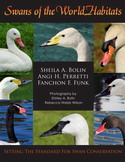Ask the Swan Specialist
Date: 12 January 2010
Hi Sherry:
The first thought is why the swan is in the salt water inlet. The South American Black-Necked swan lives around brackish water and it is believed to have a gland which can filter some salt from its water intake. However, other swan species usually do not possess this anatomical feature and therefore, cannot survive in a salt or brackish water habitat.
When did you first notice the swan being in the area? What color is its beak (this will help us identify the species)? Orange beak is a Mute Swan, Black Beak is Trumpeter, Black beak with yellow lore (marking between the beak and eye) is a Tundra swan.
If the swans are Trumpeters or Tundras, they are federally and state protected in various areas of the country. You will need to notify your local Fish & Game commission to help the swan.
If it is a Mute Swan, your state may require a license/permit to have the bird because it may not be considered a native species. If you call any state or federal entity to help in the case of the Mute swan, they will probably ignore your call or shoot the bird if they deem it not a native species.
If you can feed the bird lettuce, cracked corn mixed with layer pellet, it should do fine on its own as long as it can fly. It may have stopped in your area as a stopover on its migration pattern and got stuck in the ice/cold weather. When it warms and the bird gets its strength back, it will probably leave the area as the saltwater is not conducive to a food source.
Swans in the wild are built to withstand cold temperatures unlike captive bred swans. Even though captive bred swans have down and other warm features, if the bird is raised in Florida (for instance, because we are having this situation with our extreme cold temperatures), the bird is not going to be used to such low temps and will need to be sheltered. Birds bred in cold temperate climates still may not be able to survive some of the frigid weather that the U.S. is now experiencing but if they can fly, they will usually seek shelter without human intervention as long as they do not get stranded on the ice in a pond or lake. If this occurs, a rescue will be necessitated because predators can get to the bird and the bird will starve.
If it stays, you may have found a new friend.Good luck. Let us know how the bird is faring. The Regal Swan
Messages In This Thread
- swans survival -- Sherry Tubbs -- 11 January 2010
- Re: swans survival -- The Regal Swan -- 12 January 2010
Ask the Swan Specialist is powered by
Tetra-WebBBS 5.30 Beta © 2006-2007 Tetra-Team






